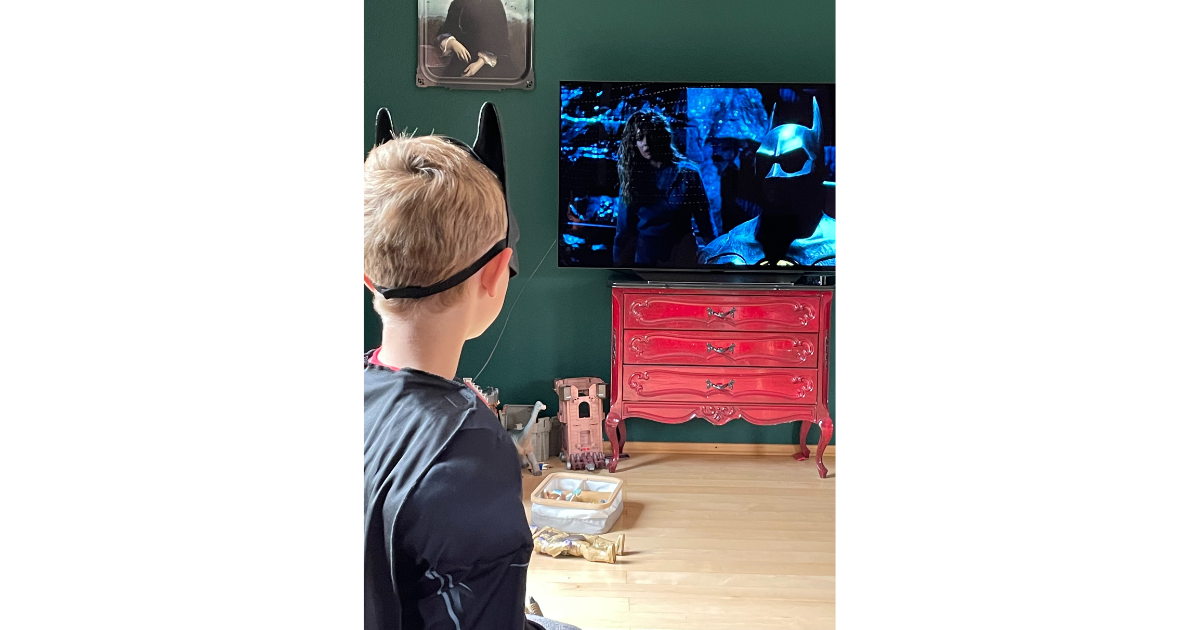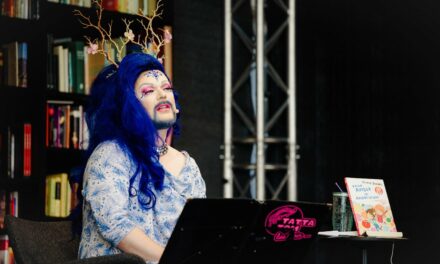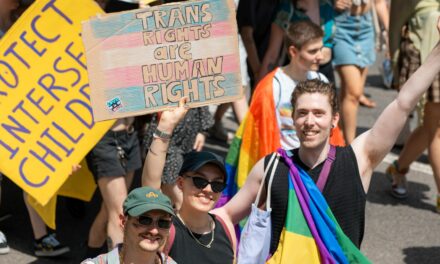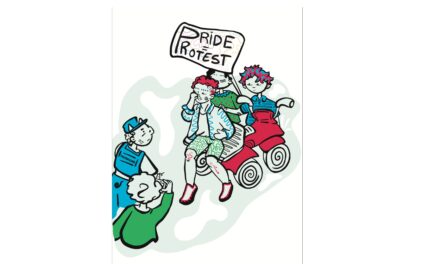
The question of the existence of ONE LGBTIQ+ community is the subject of much debate in the queer world.
Can we encompass all the manifestations, interests, profiles, struggles… of the queer world, in Luxembourg and elsewhere, in one and the same whole?
In its general action concept, the Center LGBTIQ+ CIGALE has adopted the theory put forward by Didier Eribon (2000), “[…] to speak in the name of the ‘community’ would presuppose not only that such a community exists, but that it is a homogeneous group with a clearly identifiable set of ideas or objectives. This is clearly not the case, nor is it possible – or indeed desirable – for it to become so.”
The 14 communities of the CIGALE LGBTIQ+ center, which bring together more than 300 people, certainly have in common the CIGALE Center in “LGBTIQ+ community as a necessary political fiction (…)” (Broca, 2018), but their interests, opinions and struggles sometimes diverge, or may even seem at odds with each other.
For over a year and a half, CIGALE has been developing this strategy of empowerment by encouraging community synergies, enabling it to develop a certain skill in reconciling the apparent (?) dissonances that may exist within the LGBTQIA+ communities.
The publication of the otherwise excellent article ‘Kink ist Pride’ (Mannes, July 2024) in the magazine queer.lu raised questions about what is and is not reconcilable, what would and would not create gaps in this ‘LGBTIQ+ community as political fiction’ (Broca, 2018).
It would be wrong to assert that all three rainbow family communities were shocked by the article and illustration, but it would be equally wrong to assert that they passed through them unhindered.
As a reminder, the CIGALE LGBTIQ+ Center welcomes and supports three communities concerned by this issue:
-
- The L-Mums (over 80 lesbian mums and mums-to-be and their children)
- The G-Dads (over 40 gay dads and dads-to-be)
- The Lilies – Later in life – (over 30 adults, half of whom are parents)
The aim of this article is to use the publication of the ‘Kink ist Pride’ article to illustrate, in a context of empowerment, both the concerns of rainbow families, but also the fractures within LGBTIQ+ communities that can manifest themselves, whether these fractures are real or fantasised.
Long referred to as ‘same-sex parenting families’, they are now included in the ‘rainbow’ designation to include trans, ace-aro and + parenthood. It therefore includes all families in which at least one parent identifies as LGBTQIA+.
To say that their forms are plural is an understatement:
-
- children born as a result of parental projects using MAP (IAD, IVF, GPA, etc.)
- adoption,
- co-parenthood (parents agreeing on a family plan without being a couple)
- children from a previous heterosexual union, etc.
Once these ‘objective’ characteristics have been established, the question arises as to what motivates these families, why they have gotten involved and their place within community synergies.
When the L-Mums community was created in 2021 by the members themselves, their aim was to create, at last, a safe space for lesbian mums and mums-to-be, where they could meet their peers, be informed, supported and assert their rights.
Following in their footsteps and pursuing similar objectives, 2023 saw the birth of the Lilies community, then the G-Dads.
As we can see here, the struggle of these three communities is part of the paradigm of struggles that LGBTIQ+ communities have been pursuing since the Stonewall riots and even before.
What, then, are the grievances that many parents of rainbow families, although probably not all, have with this article?
Basically, they can be summed up in four points:
-
- The illustration conveys a paedocriminal symbolism that is detrimental to their daily struggle, particularly against homophobic social representations. They shamefully equate homosexual parenthood with the world of paedophilia or think of it as a toxic family environment for children.
- While these families struggle on a daily basis for the same recognition as any other family, this article takes them back to a queer universe where sexuality, even when seen as diversity, is the focal point of LGBTQIA+ pride.
- The article runs the risk of parents of rainbow families being assimilated into this Kink universe and thus creating conditions for mobbing their children (‘I see what your dads are doing’, for example).
- The article, which appeared at the same time as petition 3198 (Exclude LGBT themes from the education of minors), adds fuel to the suspicions about them already conveyed by the petition.
Of course, it would be easy, even obvious, to say that the article ‘Kink ist Pride’ already contains, in itself, the arguments to oppose these three points, in particular the ‘Respectability Politics’ that the author links to cis heteronormativity and formulates as the fact of ‘giving in to and perpetuating the queer trauma of conditional love that many of us have already experienced through the parental home’.
While this criticism may seem well-founded when the LGBTIQ+ world is seen as consisting solely of those directly concerned, it loses its relevance when rainbow families, parents, and children are included.
First of all, it should be pointed out that rainbow families have a particular profile, since their parents may have experienced the various hostilities directed at LGBTIQ+ communities, so they are directly concerned.
At the same time, their priority is their family and more specifically their children, especially as they have experienced hatred and its effects.
To use a legal analogy, it is the best interests of the child, and more specifically, the best interests of their children.
The criticism made by Nada Negraoui, a psychologist at LILI (Luxembourg Institut for LGBTIQ+ Inclusion), one of CIGALE’s services, in her article “Debunkage de la pétition ‘ exclure les thématiques lgbt de l’éducation des mineurs” (Negraoui, October 2024) remains operative and accepted by rainbow families. We are well aware that the best interests argument is a favourite of reactionary and conservative movements, which they manipulate to convey and disseminate clearly LGBTIQ+phobic views. It is also the one used against us and our families.
In the exchanges I’ve had with rainbow families, over 140 people within CIGALE, there is no desire to censor or to silence certain currents and/or struggles taking place within LGBTIQ+ communities.
One question does arise, however: is the struggle of rainbow families entirely solvable in the queer world? Consequently, is it possible to include their voices in a generalist queer magazine which, fortunately, adopts an editorial policy that excludes censorship and aims to cover all queer subjects? Can an article on their situation be inserted after and/or before an article on bondage, puppy play and, more generally, all movements linked to Kink?
Over and above these questions, can we deny rainbow families the right to give priority to their children, even if at first sight this may be seen as a fight against conservatism?
Families are under attack from a cis-heteronormative society, and some of the criticism is extremely violent and hateful. They are all the more hurtful because they target parents and children. Just think of Meloni’s Italy, which has just withdrawn the filiations of mothers and wants to put fathers who have resorted to surrogacy in prison, and we have all read comments on social networks that compete for the prize of horror and hatred.
At the same time, the queer world has made the issue a key theme of its social struggles, including within LGBTIQ+ communities. The LGBTIQ+ NAP had a chapter on them, but it contained only one measure: International Family Equality Day. Fortunately, the current government and the authorities, in this case MEGA, the equal opportunities ministry, has decided to change things, but the fact remains that rendering the situation invisible is a symptom.
Are the gaps between rainbow families and the kink or even simply more ‘alternative’ fringes of the LGBTIQ+ communities so wide? Are they irreconcilable?
Is there a path between ‘rainbow families are traitors to the queer cause, because they conform to cis heteronormative dominations’ and ‘Kinksters are damaging our families, because the general public equates us with this sexualisation of the queer world’?
As director of the CIGALE LGBTIQ+ Center, I believe – and we are doing everything we can to ensure – that there can be spaces where synergies can be articulated in common struggles, provided that everyone can understand that other spaces can coexist, even if interests may seem to diverge.
This brings us back to CIGALE’s ambition, set out at the beginning of this article: to bring about the existence of ‘an LGBTIQ+ community as a necessary political fiction’ (Broca, 2018), while acknowledging that interests, opinions and struggles sometimes diverge, and may even appear to be poles apart. There is still a long way to go, but I am convinced, and we are convinced at CIGALE, that respect for each other and dialogue between communities is the key to making this necessary political fiction a reality. This is the strategy we are pursuing. It is complex and not without its tensions, but it is the only possible strategy if we want to work together for a more inclusive society.
Article translated from French




